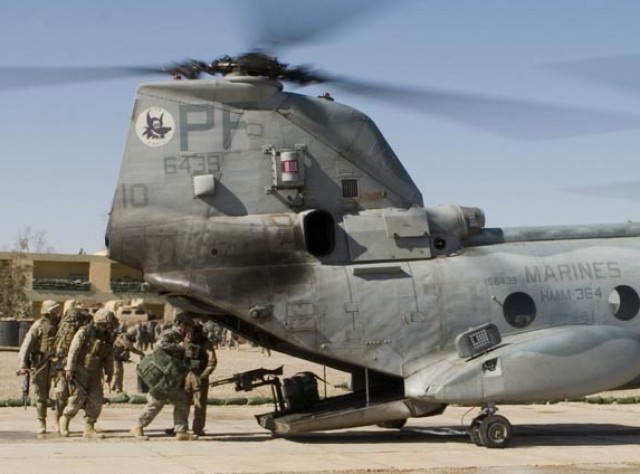WASHINGTON (American Forces Press Service, Feb. 22, 2007) - The enemy in Iraq is adaptive, and is interested in "catastrophic attacks," the commander of coalition ground forces in Iraq said today.
Lt. Gen. Raymond T. Odierno, commander of Multinational Corps Iraq, met with Pentagon reporters over a satellite link from Baghdad.
Insurgents blew up a tanker filled with chlorine yesterday in southern Baghdad. The attack killed at least two people and wounded more than 30. Coalition officials in Baghdad said this could be an escalation in the insurgent attacks.
The attacks are meant to cause fear, and chlorine gas - which was used as a chemical agent in World War I - could be an attempt to cause more fear, officials said.
U.S. Soldiers operating 12 miles northwest of Fallujah discovered a car bomb factory Feb. 20, Odierno said. They found numerous artillery rounds, mortar rounds, bombs, rockets, gutted anti-aircraft shells, a pickup truck and three other vehicles that were already in various stages of preparations as car bombs.
"We also found ingredients to be used to devise or enhance explosives such as fertilizer and chlorine cylinders," the general said.
The introduction of chlorine illustrates that the enemy continues to alter its tactics, Odierno said.
"What they're trying to do is try to adapt in such ways where they can continue to create instability, and that's what they're doing, especially with these chlorine (vehicle-borne improvised explosive devices)," he said.
But as the enemy changes its tactics, he noted, so will coalition forces.
The general said eight coalition helicopters have been shot down since Jan. 20. A UH-60 Black Hawk came down yesterday north of Baghdad. The cause of that downing is still being investigated, Odierno said, but initial reports indicate enemy fire brought it down.
"We are aggressively examining the conditions of each incident and adapting tactics and techniques to address the issue."
The helicopters may have run into enemy ambush sites, Odierno said.
"We are studying those intently, and we're trying to learn from those, and we will learn from those and we will adapt our tactics," he said. "I think they've probably been trying to do this for a long time, but my guess is we have a cell out there that's somewhat effective."
<b>Resolve, Patience Needed</b>
The environment in Iraq is extremely complex, and the American people are going to have to be patient, Odierno explained.
He said the threats to stability differ from province to province, and there is no silver-bullet solution to the situation. He said sectarian strife, Sunni and Shiia extremists, al Qaeda, crime and subversive influences from around the region are the main threats in the country.
"Al Qaeda and Sunni insurgents continue to try to destabilize and delegitimize the government of Iraq," Odierno said. He said the groups will continue to launch "catastrophic events" such as car bombs and suicide bombers to kill hundreds of innocent civilians. The groups also continue attacks on coalition and Iraqi security forces to create the impression of instability.
Shiia extremists are working against the Iraqi government to try to gain power. "They are involved in sectarian violence, and in some cases outright murder of civilians," Odierno said.
Both groups are trying to take advantage of the infant government. He reminded reporters that the Iraqi government is just 10 months old and is working to put its institutions in order while fighting a war.
The stepped-up security operation under way in Baghdad reflects the importance of securing the Iraqi capital to the overall effort in the country, Odierno told reporters. "Baghdad is key to stability in Iraq," he said.
He said Operation Fard al-Qanun - Enforcing the Law -already is paying off. U.S. troops are arriving in the city, and two brigades of Iraqi troops have already arrived. With four more battalions of Iraqi forces due in Baghdad in the next four weeks, the government will have lived up to its pledge, he said.
The idea behind the operation is to give the government enough breathing room to reach out and prove to the people of Iraq that the government "is able to protect all its citizens regardless of sect or ethnicity," Odierno said.
The Iraqi commander in Baghdad, Lt. Gen. Abboud Gambar, has set up his headquarters and is actively directing his army and police forces.
Odierno said he has visited the joint security stations in Rusafa and Dura, and that the Iraqi army, police and U.S. forces are working side by side and going out on patrols together. Preventing car bombers from plying their trade is a big part of the effort, he said.
"We know there will be some tough days ahead," he said. "The success of this mission will come over months, not weeks or days."


Social Sharing